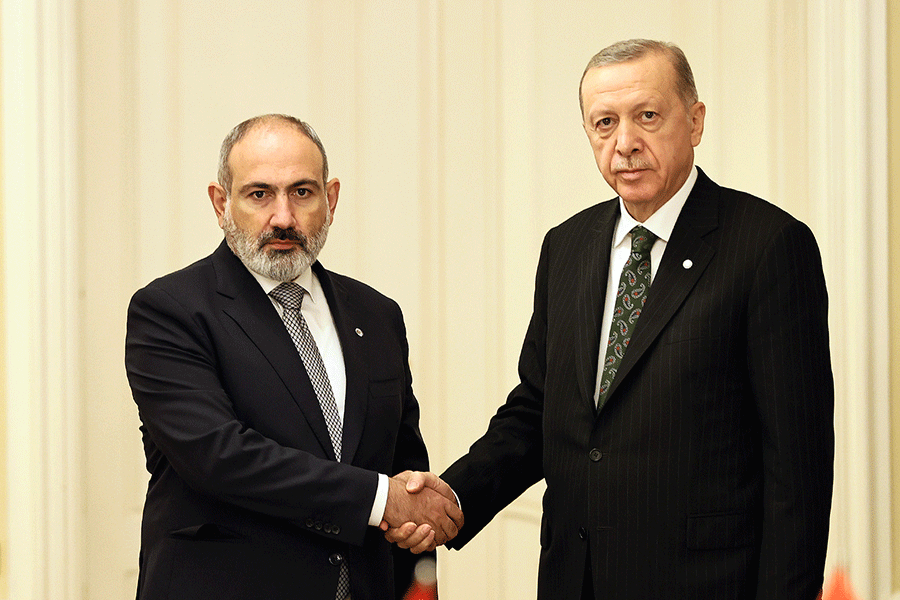by Benyamin Poghosyan
The relationship between Armenia and Turkey has a significant influence on the geopolitical landscape of the South Caucasus. The Turkish blockade of Armenia and refusal to establish diplomatic relations, coupled with the Nagorno-Karabakh conflict, have restricted Armenia’s ability to pursue a more flexible foreign policy, effectively binding it to an alliance with Russia. Normalizing relations with Azerbaijan and Turkey would allow Yerevan to explore foreign and defense policy alternatives beyond its reliance on Russia.
The United States has persistently advocated for Armenia–Turkey normalization, viewing this as an essential step in untangling the post-1994 status quo in the South Caucasus, which is marked by Russian dominance through its military and economic presence in Armenia. Washington has actively engaged in many efforts, including track 1, track 1.5, and track 2 diplomacy, with initiatives such as the Turkish Armenian Reconciliation Commission and the 2008–2009 Armenia–Turkey “football diplomacy” serving as notable examples.
Shifts in Regional Dynamics: Armenia–Turkey Normalization in the Wake of Recent Conflicts
Read also
The 2020 Nagorno-Karabakh War, Azerbaijan’s military takeover of Nagorno-Karabakh in September 2023, and ongoing Armenia–Azerbaijan negotiations for a peace agreement have opened avenues for altering the regional equilibrium, potentially paving the way for Armenia–Turkey normalization. Russia has supported the process this time, seeing it as a step toward managing South Caucasus issues within the 3+3 (Armenia, Azerbaijan, Georgia, Russia, Turkey, Iran) format, potentially mirroring the Astana format for Syria. The new phase of Armenia–Turkey normalization, with a kickoff meeting in Moscow in January 2022, underscored Russia’s endorsement of the initiative. Russia’s positive stance did not diminish US support for the new phase of Armenia–Turkey normalization. While Moscow may have hoped that an Armenia–Azerbaijan peace agreement based on the November 2020, January 2021, and November 2021 trilateral statements and Armenia–Turkey normalization backed by Russia would sideline Western actors in the South Caucasus, the US viewed Armenia–Turkey normalization as a means of reducing Russian influence in Armenia.

Benyamin Poghosyan
Following the onset of the Ukraine War, as Russia–US relations plummeted to their lowest point since the peak of the Cold War in the late 1950s and early 1960s, the South Caucasus emerged as another arena of Russia–US confrontation. In this context, Armenia–Turkey normalization became increasingly critical for both Moscow and Washington. Russia remains intent on excluding the US from the region and views coordination with Turkey, including on the Armenia–Turkey track, as essential. Moscow likely understands that Armenia–Turkey normalization could increase Turkish influence in the region, which conflicts with its interests. However, the Kremlin may perceive this as a lesser evil compared to direct US involvement. Meanwhile, the US has ramped up its engagement in the Armenia–Azerbaijan and Armenia–Turkey normalization processes. In 2023 and 2024, Americans organized three summits between Armenian and Azerbaijani foreign ministers to finalize the peace agreement, and high-level US officials frequently visited Armenia and Azerbaijan.
In June 2024, during an interview with the Radio Liberty Armenian service, US Assistant Secretary of State James O’Brien stated that a peace treaty between Armenia and Azerbaijan would not only end their prolonged conflict but also reduce Russian influence in the region and facilitate a new trade route from Central Asia to Turkey. O’Brien emphasized that there was a once-in-a-generation, possibly a once-in-several-generations, opportunity to establish a trade route from Central Asia to the Mediterranean, contingent on peace between Armenia and Azerbaijan. This trade route, he explained, would supplement existing transport links running from Central Asia to Georgia’s Black Sea coast through Azerbaijan. Together, those two routes would provide Central Asian countries with their first access to global markets independent of Russia or China.
An intriguing situation has emerged as both Russia and the US view Armenia–Turkey normalization as a positive development, albeit for different reasons. Russia seeks to maintain its “co-optation” model of relations with Turkey and exclude the influence of the US and the European Union from the region. At the same time, the US hopes that Armenia–Turkey normalization will lead to a decrease in Russian influence in the South Caucasus and Central Asia. Given the elevated confrontation between Russia and the US, both powers may find a normalization process under the auspices of the opposite side unacceptable. Consequently, the Armenia–Turkey normalization process and the broader geopolitics of the South Caucasus have become entwined with the Russia–West rivalry, adding further complexities to the situation. Azerbaijan’s reluctance to sign an agreement with Armenia under Western negotiation platforms, thereby opening the way for Armenia–Turkey normalization, can be seen as another piece of the geopolitical puzzle. In this scenario, Baku acts in favor of Russia.
In the current geopolitical climate, Armenia should insist on implementing the Armenia–Turkey agreements reached in July 2022 and reaffirmed in 2023 and 2024 during several high-level meetings and telephone calls. Yerevan can argue that these steps will create a positive environment and build confidence, which is essential for contemplating further progress. As long as the Russia–West confrontation persists without a decisive victory for either side, this strategy could enable Armenia to avoid becoming entangled in a geopolitical “elephant war.” Armenia will be able to avoid choosing between Russian or American visions of its relations with Turkey and maintain a balanced approach.



















































